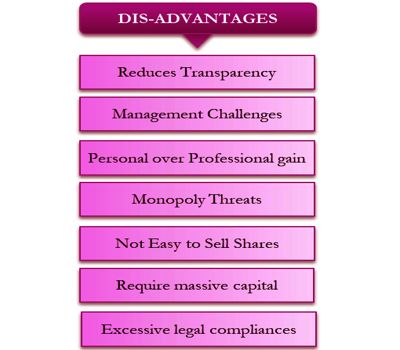Disadvantages of Holding Company
A holding company is a conglomerate corporation formed for the purpose of holding a controlling interest in several companies. Such a company does not usually carry any traditional business activities, such as manufacturing or offering services. Another name for a holding company is a parent company. The purpose of the company is to form corporate groups instead of through their stock ownership. And, the company that the parent company control is an operating company or subsidiary.
Disadvantages of Holding Company

The following are the main disadvantages of holding companies:
- Over capitalization
Since the capital of the holding company and its subsidiaries may be pooled together it may result in overcapitalization. Shareholders would get not get a fair return on their invested capital.
- Forced Appointment of Directors
The subsidiary companies may be forced to appoint persons of the choosing of holding companies as the directors or other officers at unduly high remuneration
- Speculation in Shares
By manipulation of accounts, directors may speculate in the shares of the subsidiary companies if such shares are listed in the stock exchange
- Misuse of power
The financial liability of the members of a holding company is insignificant in comparison to their financial power. It may lead to irresponsibility and misuse of power.
- Creation of Secret reserves
Secret reserves may be created by dishonest directors to the detriment of the minority interest.
- Exploitation of subsidiaries
The holding company may exploit the subsidiary companies. The subsidiaries may be compelled to buy goods from the holding at high prices. They might be forced to sell their produce to the holding company at very low prices.
- Difficulties in Valuation of Stock
Difficulties may be faced for valuing stock when it consists of huge quantities of inter-company goods.
- Manipulation
Information about subsidiaries may be used for personal gains. For example information on the financial performance of subsidiary companies may be misused to indulge in speculative activities.
- Fear of Mismanagement
When a group has a good number of subsidiary companies and managerial ability is limited, there may be mismanagement resulting in damage to the group as a whole.
- Secret monopoly
It may lead to the creation of secret monopolies. These secret monopolies may try to eliminate competitors and prevent the entry of new firms. They may exploit consumers by charging unreasonable prices.
- Fraud in Inter-company Transactions
Inter-company transactions are often entered at fanciful and unduly high or low prices in order to suit the holding companies.
Moreover, there are possibilities for a holding company to expand through the use of debt or leverage, building an intricate corporate structure that can include unrealized values, thus creating a risk if interest rates on obligations or the evaluation of assets posted as a guarantee for loans alter radically.
















